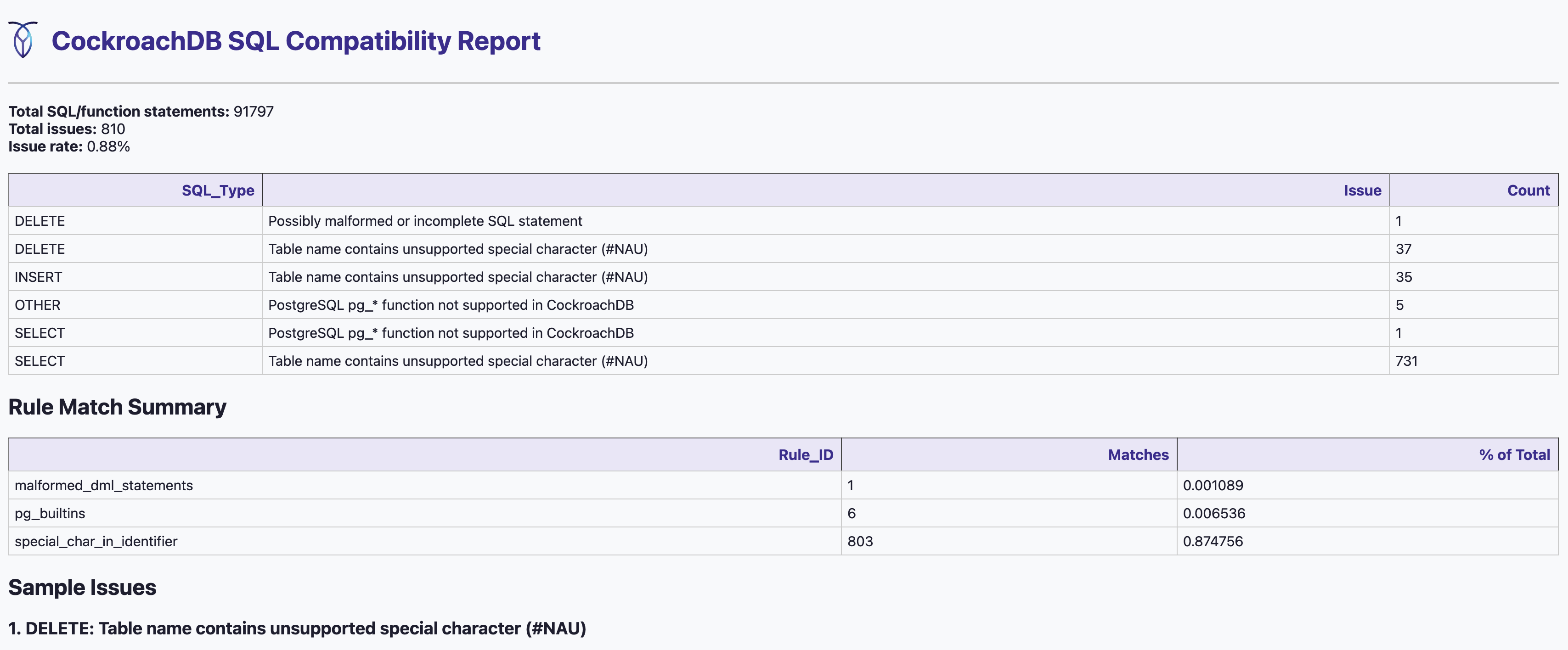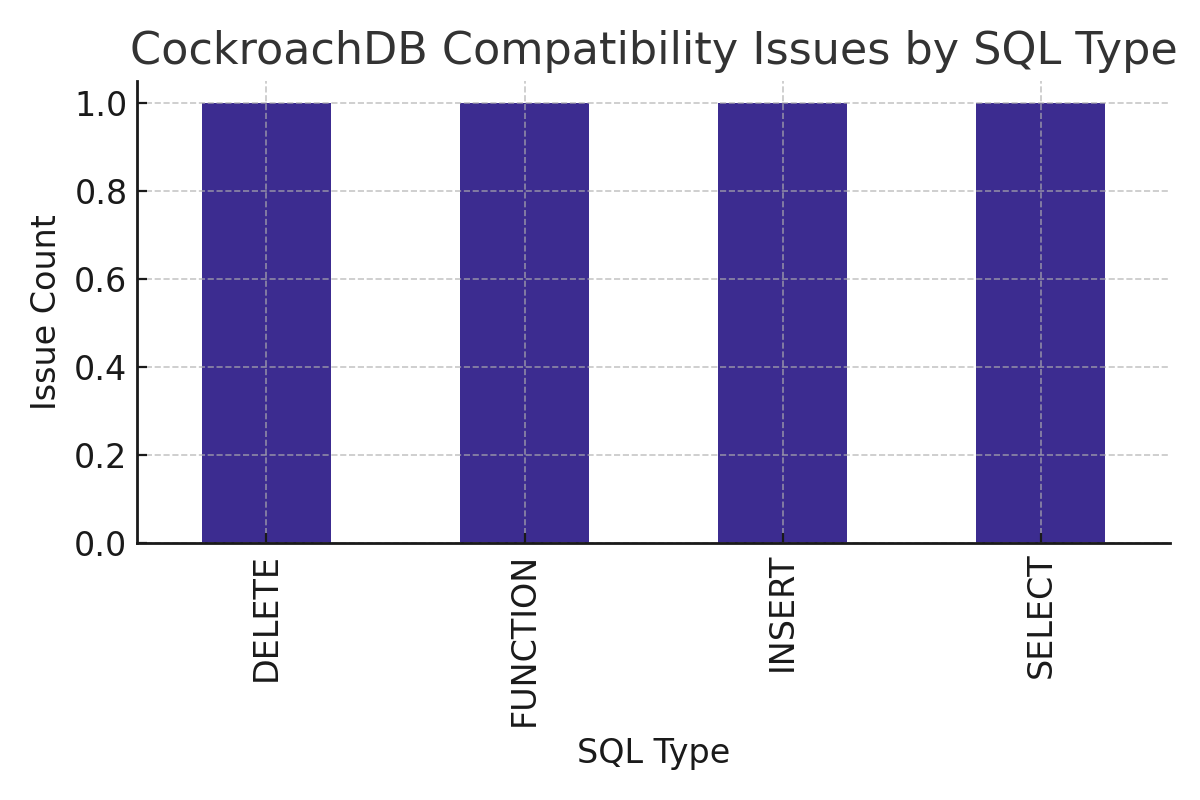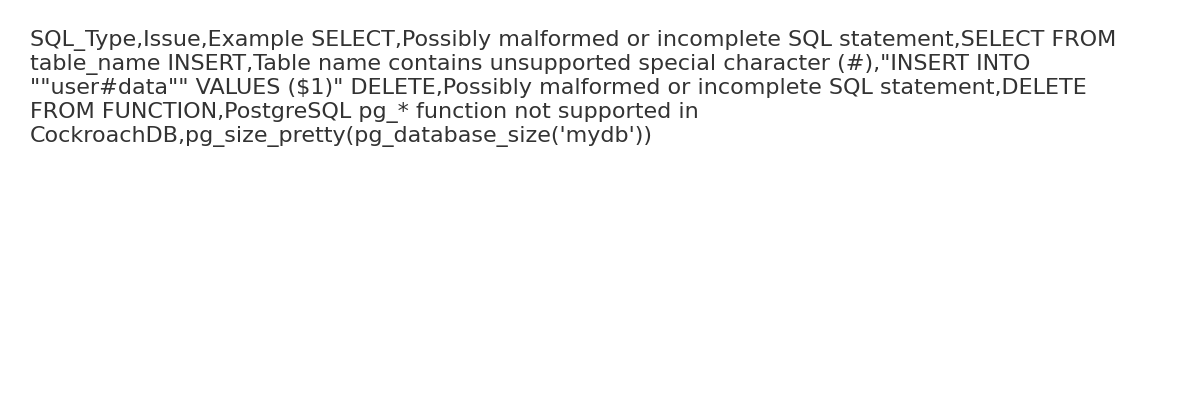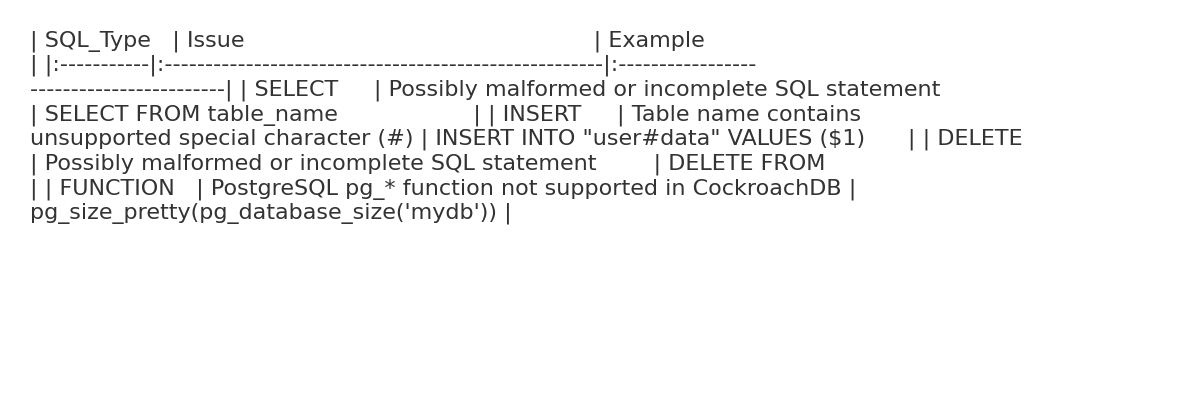A powerful CLI tool to extract, deduplicate, and analyze SQL logs for CockroachDB compatibility using a flexible, rule-based engine.
- Works with any SQL dialect (PostgreSQL, MySQL, Oracle, etc.)
- Extracts SQL and function calls using customizable search terms (e.g.
execute,pg_) - Deduplicates repeated SQL statements from logs
- Analyzes SQL using a YAML-based rule engine
- Supports default compatibility rules (PostgreSQL ➜ CockroachDB)
- Allows custom rule sets via
--rules - Logs analysis output to both terminal and
crdb_sql_audit.log - Automatically detects SQL statement types (e.g. SELECT, DELETE)
- Friendly CLI with
--helpand--version - Export full reports in multiple formats:
.sql: Deduplicated queries.csv: Raw compatibility issue list.md: Developer-friendly Markdown report.html: Interactive browser report with sorting/filtering.png: Visual bar chart of issues
| Report Type | Preview |
|---|---|
| HTML |  |
| Chart |  |
| CSV |  |
| SQL |  |
| Markdown |  |
pip install crdb-sql-auditgit clone https://github.com/your-org/crdb-sql-audit.git
cd crdb-sql-audit
python -m venv venv
source venv/bin/activate
pip install .python -m build
pip install dist/crdb_sql_audit-0.2.0-py3-none-any.whlcrdb-sql-audit \
--dir /path/to/logs \
--filters execute,pg_ \
--out output/reportYou can also analyze a single file:
crdb-sql-audit \
--file /path/to/logfile.log \
--filters SELECT,INSERT \
--raw \
--out output/single_file_report
⚠️ You must provide either--diror--file, but not both.
--dir Directory containing SQL log files (mutually exclusive with --file)
--file Single SQL log file (mutually exclusive with --dir)
--filters Comma-separated search keywords to extract SQL (default: 'LOG: execute', 'pg_', 'LOG: statement:')
--raw Treat each matching line as a raw SQL statement (default: False)
--rules Path to YAML rules file (optional, default: built-in PostgreSQL rules)
--out Output file prefix (default: crdb_audit_output/report)
--debug Enable debug-level logging
--help Show usage help
--version Show current versioncrdb-sql-audit --helpcrdb-sql-audit \
--dir ./logs \
--filters execute,pg_ \
--rules ./rules/mysql_to_crdb.yaml \
--out output/mysql_report💡 This tool supports auditing any SQL dialect — just provide a rule set for your source database (e.g., PostgreSQL, MySQL, Oracle).
output/
├── report.sql # Deduplicated SQL
├── report.csv # Compatibility issues
├── report.md # Markdown summary
├── report.html # Interactive dashboard
├── report_chart.png # Visual chart of issues
├── crdb_sql_audit.log # Full run log
To analyze SQL logs effectively, we recommend the following preprocessing steps:
grep "execute" app.log > sql_only.log
# or to include pg_ built-in function usage:
grep -E "execute|pg_" app.log > sql_only.logsplit -b 50M sql_only.log chunks/sql_chunk_crdb-sql-audit --dir chunks --filters execute,pg_ --out output/reportThis tool automatically supports reading:
- ✅ Regular
.logor.txtfiles - ✅ Compressed files:
.gz,.xz - ✅ Folders with mixed log formats
You can pass these directly using --file or --dir:
crdb-sql-audit --file logs/app.log.gz --out output/report_from_gzThis tool supports two modes of SQL log analysis:
| Mode | Behavior |
|---|---|
--filters (default) |
Filters log lines using keywords like LOG: execute, pg_, etc. |
--raw |
Analyzes every line as a potential SQL statement — no filtering applied |
✅ Use
--rawif you want the most complete coverage, especially for mixed-format or unknown logs.⚠️ Warning: large logs +--raw+--debugmay generate gigabytes of audit output.
Rules are written in YAML and matched against each SQL line. Example:
💡 This is also the default rule if you don't provide
--rulesparam.
# postgres_to_crdb.yaml — Comprehensive CRDB Compatibility Rules based on https://www.cockroachlabs.com/docs/v25.2/sql-feature-support
- id: malformed_dml_statements
match: '^(SELECT|INSERT|UPDATE|DELETE FROM)\s*$'
message: "Possibly malformed or incomplete SQL statement"
level: warning
tags: [syntax]
- id: special_char_in_identifier
match: '"[^\"]*#\w*"'
message: "Table name contains unsupported special character (#)"
level: error
tags: [table, identifier]
- id: pg_builtins
match: '^.*\bpg_\w+\s*\(.*$'
message: "PostgreSQL pg_* function not supported in CockroachDB"
level: error
tags: [function]
- id: with_cte
match: '^\s*WITH\s+'
message: "CTE (WITH clause) detected"
level: warning
tags: [cte, syntax]
- id: upsert_syntax
match: '^\s*UPSERT\s+'
message: "UPSERT syntax (CockroachDB supports but should be reviewed)"
level: info
tags: [upsert, insert]
- id: json_ops
match: '->|->>|::json[b]?' # Look for JSON navigation or cast
message: "JSON/JSONB usage detected"
level: info
tags: [json]
- id: row_values
match: '\(.*\).*IN\s*\(' # e.g., WHERE (a, b) IN ((1, 2))
message: "ROW VALUES in IN clause"
level: warning
tags: [rowvalues, comparison]
- id: window_function
match: '\bOVER\s*\('
message: "Window function usage (e.g., RANK, ROW_NUMBER)"
level: info
tags: [window, analytics]
- id: set_ops
match: '\s+(UNION|INTERSECT|EXCEPT)\s+'
message: "Set operation (UNION, INTERSECT, EXCEPT)"
level: info
tags: [setops]
- id: case_expr
match: '\bCASE\b.*\bWHEN\b.*\bTHEN\b'
message: "CASE expression detected"
level: info
tags: [case, conditional]
- id: time_interval
match: 'INTERVAL\s+[''\"]'
message: "TIME INTERVAL expression"
level: info
tags: [interval, time]
- id: group_by_rollup
match: 'GROUP BY ROLLUP\('
message: "ROLLUP clause used"
level: warning
tags: [aggregation, rollup]
- id: filter_clause
match: 'FILTER\s*\(\s*WHERE'
message: "FILTER clause used in aggregation"
level: warning
tags: [aggregation, filter]📦 Multiple rule sets can be created to target different SQL dialects (e.g.,
postgres_to_crdb.yaml,mysql_to_crdb.yaml, etc.)
Use regex101.com to test your patterns:
- Set the flavor to Python
- Paste your rule into the regex field
- Paste a sample SQL line into the test area
You can also test your rules directly:
import re
pattern = re.compile(r'^.*\bpg_\w+\s*\(.*$', re.IGNORECASE)
sql = "SELECT pg_backend_pid()"
print(bool(pattern.search(sql))) # ✅ TrueYou can use basic Unix commands to check for patterns like pg_ functions directly in your log chunks:
| Task | Command |
|---|---|
| Total matches across chunks | grep -oE '\bpg_[a-zA-Z0-9_]+\(' chunks/* | wc -l |
| Unique function names | grep -oE '\bpg_[a-zA-Z0-9_]+\(' chunks/* | sort | uniq |
| Count occurrences of each function | grep -oE '\bpg_[a-zA-Z0-9_]+\(' chunks/* | sort | uniq -c | sort -nr |
| Full SQL lines containing pg_* | grep -E '\bpg_[a-zA-Z0-9_]+\(' chunks/* |
Also, before or after running crdb-sql-audit, you can inspect your logs to see how often common filters appear.
For example, to count usage of PostgreSQL built-ins and log patterns:
{
echo "🔍 pg_* function usage:"
grep -oE '\bpg_[a-zA-Z0-9_]+\(' chunks/* | sort | uniq -c | sort -nr
echo ""
echo "🔍 PostgreSQL LOG prefixes:"
grep -oE 'LOG: execute|LOG: statement:|LOG: duration:' chunks/* | sort | uniq -c | sort -nr
}This will show counts of:
- Each
pg_function used (e.g.pg_backend_pid() - Number of log lines using
LOG: execute,LOG: statement:, andLOG: duration:
✅ Useful for checking whether your filters (
--filters) are likely to match anything in the input.
This project includes a test suite using sample logs and rules to validate behavior.
python tests/test_runner.py- Runs
crdb-sql-auditon a small sample of PostgreSQL-style logs - Uses
tests/rules/test_rules.yaml - Verifies that a CSV report is created with expected issues
✅ This runs automatically in GitHub Actions on every commit to main.



